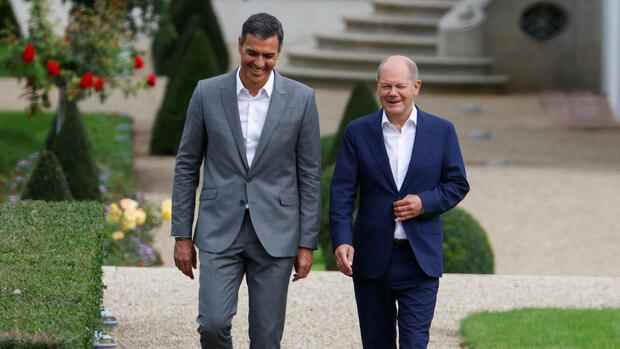Chancellor Olaf Scholz and Spain’s Prime Minister Pedro Sanchez are pushing for Spain and Portugal to be connected to the European gas grid.
(Photo: Reuters)
Madrid Spain and Germany are joining forces to build a new pipeline that will transport gas from Spain to northern Europe. Europe needs a large European network for electricity, gas and, in the future, green hydrogen, said Chancellor Olaf Scholz on Tuesday at a joint press conference with Spanish Prime Minister Pedro Sánchez. “We will do everything possible to achieve that,” explains Scholz.
Scholz had invited Sánchez to the federal cabinet’s closed meeting on the security situation and the security of energy supply in Schloss Meseberg. It was a highly symbolic gesture, intended to show that we are pulling together to secure the energy supply.
“We own 30 percent of all European regasification plants in Europe,” said Sánchez. Regasification systems are necessary to convert liquid gas that comes by ship back into the gaseous state so that it can be transported further through pipelines within Europe. “But we can’t use them so far because there are bottlenecks and we have to solve that.” are missing pipelines through which the gas can be transported from Spain to Northern Europe.
In the future, they will be used to transport green hydrogen. Madrid is particularly committed to another connection to France, but Paris refuses.
Top jobs of the day
Find the best jobs now and
be notified by email.
Even experts are skeptical. Diego Rodríguez, an energy expert from Madrid’s Complutense University, said: “The pipeline between France and Spain is not the problem.” explains the energy expert. “That would take years.”
Plan B by Sanchez
If the so-called Midcat pipeline to France does not materialize, Sánchez’ Plan B is a pipeline through the Mediterranean to Italy. There are already large enough pipes there to transport the gas to the rest of Europe. In Italy, however, there are elections in September and it is completely unclear how the new government will position itself on such a project.
In the energy crisis, Spain is becoming a pioneer in measures to limit high electricity prices and, together with Portugal, introduced a gas price cap in mid-June.
It is limited to one year and limits the price of the gas used to produce electricity to an average of 50 euros per megawatt hour. That’s a fraction of the current market price. Gas-fired power plants are reimbursed for the difference between the price cap and the market price. As a result, the price of electricity has fallen by an average of 17 percent, according to the Spanish government.
In addition, Spain recently passed an excess profit tax in order to skim off the high profits of the energy companies and thus finance aid for consumers. Sánchez explained that the measure was well received by the population, who had the impression that burdens were being shared more fairly.
Scholz sees Germany prepared for the next two winters
Scholz did not answer the question that Germany also wants to finance the planned relief for families with such an excess profit tax. However, he promised to come up with proposals to ease the burden on citizens and businesses “very soon”.
There are no pipelines transporting gas from Spain to northern Europe.
(Photo: Reuters)
In addition, the government is working on measures to combat the high prices on the energy market. The current prices are not justified and do not reflect the real situation.
Scholz sees Germany prepared for the winter given the filling level of the gas storage facilities. One could say “with all caution” that “we have probably got what is necessary on the way and can get even further on the way to get through this winter and through the next winter,” said the SPD politician. For example, the gas storage tanks are much better filled than expected some time ago.
More: Third relief package – The federal government could decide on these measures

